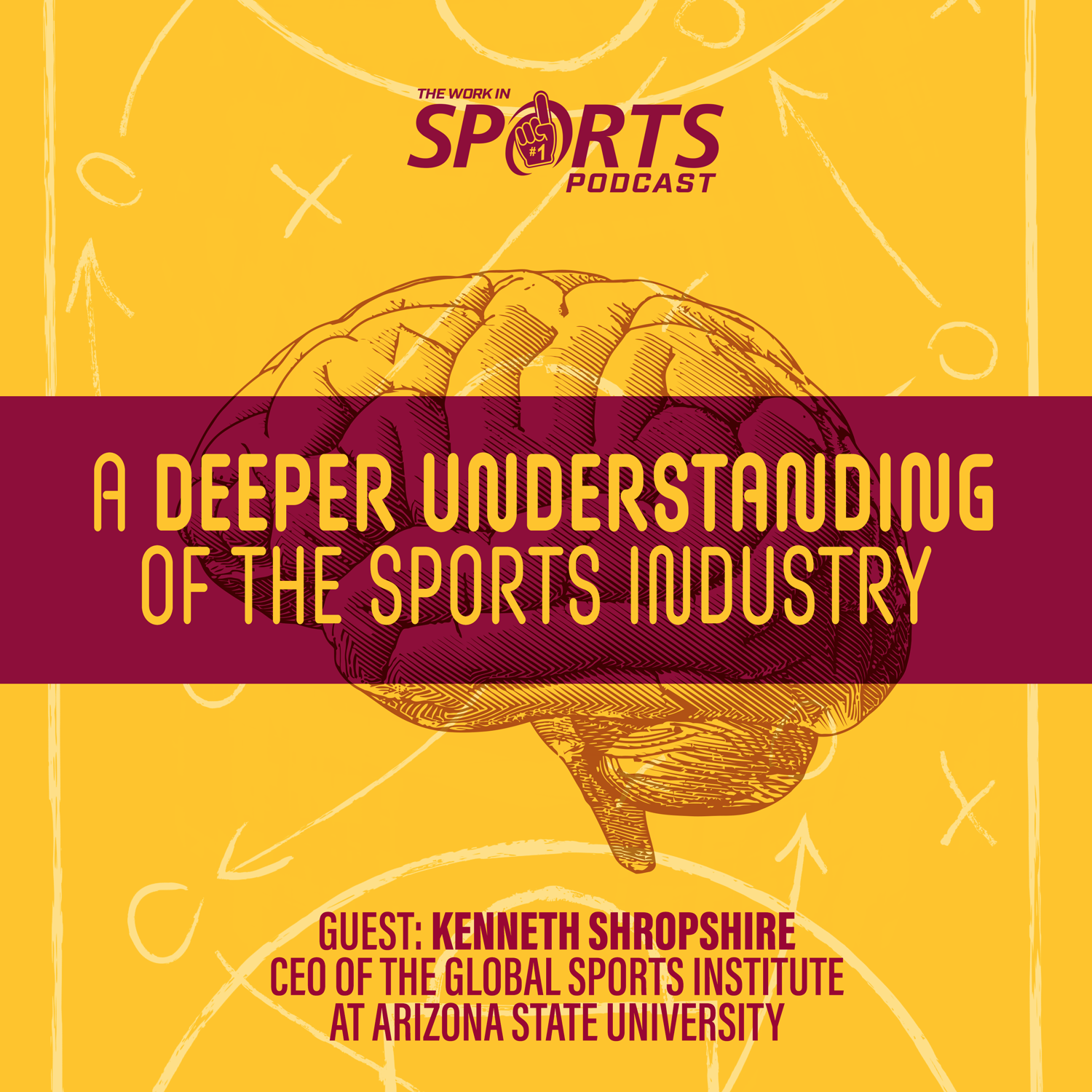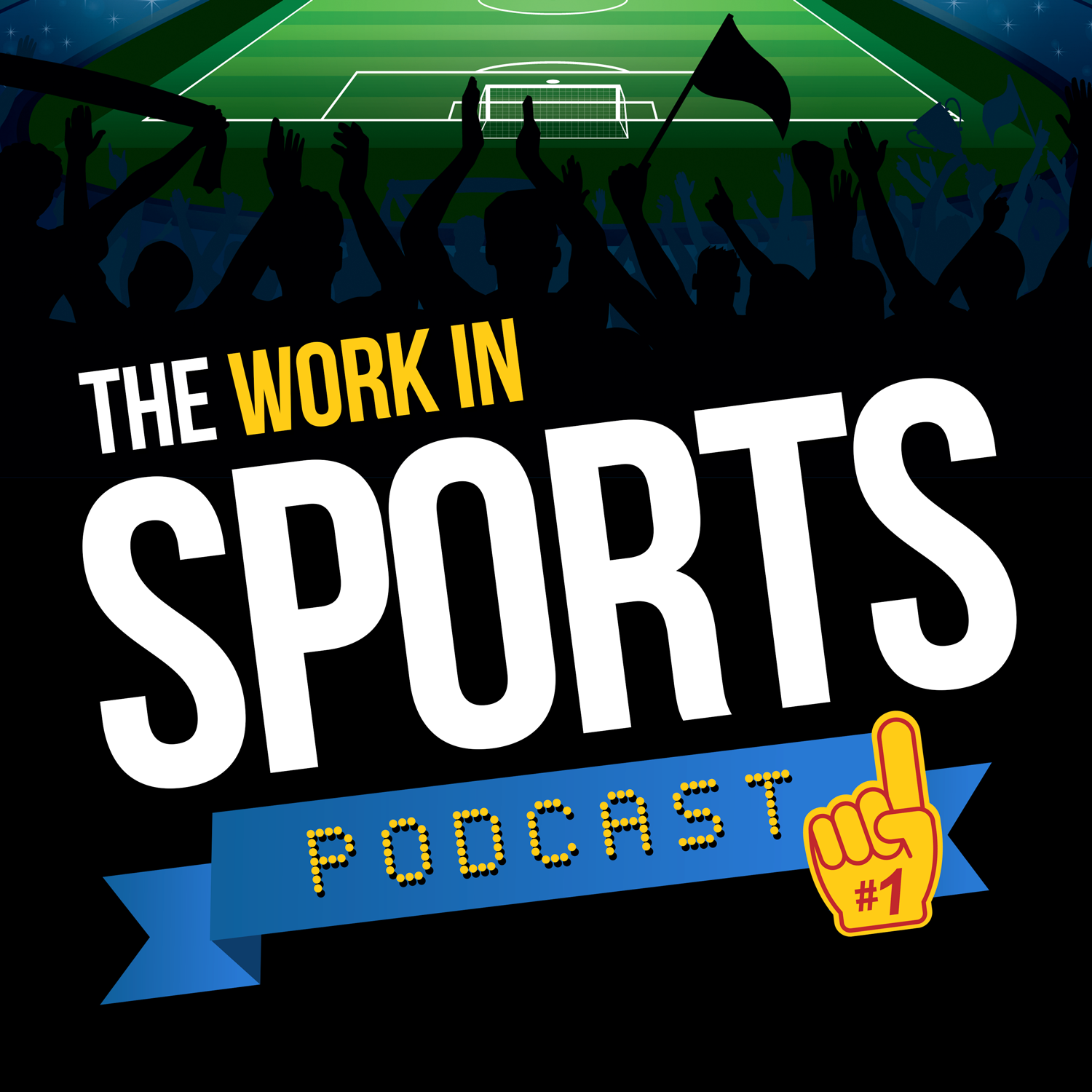- Job Seeker Resources
- |
- Last Updated: May 17, 2021

Kenneth Shropshire: A Deeper Understanding of the Sports Industry
Kenneth Shropshire, CEO of the Global Sports Institute at Arizona State University joins the Work in Sports podcast to discuss the future of our industry
Hey it’s Brian before we start today's podcast episode with Kenneth Shropshire CEO of the Global Sport Institute … let’s talk about, the master's program at the University of Dubuque!
If you’ve been considering getting a masters with a foundation in business, but an emphasis in sports, the Masters in Management - Sports Management at the University of Dubuque could be your perfect mix.
I’ve long state my personal preference is for Masters in Sports Management to be rooted in business, since that is the language of our world. Sports is just another big business, but in a much cooler package if you ask me.
The University of Dubuque program offers face-to-face or online options and is just a 30-credit hour program, so it can be completed in 1 year! The curriculum is focused on building leaders in the sports world and includes integrated field experience and professional development opportunities.
Check out the University of Dubuque's program - visit dbq.edu/mmsm
Now let’s start the countdown…
Hi everybody, I’m Brian Clapp, Director of Content for WorkInSports.com and this is the Work in Sports podcast
Sometimes we act like sports is settled science. Athletes play games, fans buy tickets and t-shirts, coaches coach, trainers nurture, businesses buy suites and entertain clients -- it’s the circle of sports.
But in reality, there is much more than that going on in the business of sports. Sure we all still care about the box score of last nights game, we want to know why Kawhi Leonard is able to do what he does, how Tom Brady seems to defy the laws of aging and understand the rise of the Minnesota Twins… but in all honesty, sometimes that’s the superficial part of the industry.
Yes, it’s the most important, without games and achievements and stars there wouldn’t be anything else. But, we should be proud that there is much more to contemplate. The sports product is more than beefcakes running fast and jumping high, there are intricacies and impacts that need to be studied and better understood.
But sports is much more than the elite, it’s also the everyday. The athletes that aren’t on TV, still have questions that need answering - like should your child play football with a concussion? What are the chances your child can become a pro athlete? Should you drink Gatorade instead of water?
The communities who support teams have questions - like should the public fund a new stadium in their city? And why aren’t more Latina girls participating in sports?
These are the types of questions the Global Sport Institute at Arizona State University sets out to solve through research. But this isn’t the type of research that gets passed around from scholar to scholar never making a real impact, it’s the type that is filtered down into the communities and to the people that need them most.
One of the massive advantages of the Global Sports Institue is that it works cross-functionally with other departments within Arizona State, from engineering to sociology, to the athletic department and beyond. That’s how they achieve the real depth of knowledge and game-changing research abilities.
At the head of this program is Global Sport Institute CEO and this week's guest, Kenneth Shropshire.
It’s funny, I’m 44 years old, so I don’t generally refer to people as Mr. or Mrs. that often -- I usually go first name and am comfortable with that. But Kenneth Shropshire is a Mr. Shropshire… he is a commanding presence with a global impact over his 40 years in the sports industry. We’ll get into his impressive background during the interview, but know this… if you hear me call him Kenneth, it was because he asked me to… I kept wanting to call him Mr. Shropshire, out of respect for his worldly accomplishments as they relate to race, college sports, sports agency and so much more…
Here he is, Mr. Kenneth Shropshire, CEO of the Global Sports Institute
Questions for Kenneth Shropshire, CEO Global Sport Institute
1: You have long been at the forefront of the discussion of race, diversity, and inclusion in sports, which means we have many deep subjects to dive into during this conversation. But let’s start out with a little background on both you and the Global Sport Institute.
Economics degree from Stanford, Law degree from Columbia… and then a long career in sports, what led you to make a career in sports your focus?
2: You’ve been part of the Los Angeles Olympic Organizing Committee in the ’80s, professor and director of the Wharton Sports Business Initiative at University of Pennsylvania, and a board member of multiple sports businesses. Most recently you added to your lengthy and impressive resume by becoming the CEO of the Global Sport Institute at Arizona State – one of the main goals of the Global Sport Institute is to Change the World Through Sport – honorable mission, what is your vision for the GSI?
3: One thing I really liked to read about GSI was how you “bridge the gap between academic research and real-life implications by translating our findings into meaningful information that is easily understood, and we actively share that knowledge with the audiences who need it most.”
This really spoke to me, because it seems so much research is done in a silo, where it’s published for no one to see, or just echo chambered amongst other academics …but you are striving to bring research to the audiences who need it most, how do you do this, and how effective has it been?
4: One statement I heard you emphasize in an article about the Institute was an aim to, “make the people in sport better, make sport better and make the world better as a result”. Where do you see the greatest opportunities to live this mission?
5: The Institute clearly has an innovative edge, researching everything from training methods to economic impacts of sports facilities – but it also has a deep focus on societal issues such as activism, race, diversity, gender and more.
I find these conversations to be the most interesting in sport - they truly frame our future.
Let’s start wide and work our way back in – in your view are we making greater progress as a society on issues of race and gender as they relate to sports and inclusion… or are the victories still few and far between, and just better publicized?
6: What about social media – athletes have a platform like never before to broadcast their voice and be heard, to connect directly with fans, to be seen as a person rather than a jersey, to criticize Presidents and policy…but on the flip side, they also are opened up to anonymous attacks, hurtful words, and a very vocal hatred.
Does this communication platform help or hurt our growth as a sports society?
7: Are teams doing enough to support their athletes? We saw the Utah Jazz ban a fan for life after he made derogatory remarks to Russell Westbrook, but then we see my hometown Boston Celtics give just a 2-year ban for similar behavior directed at Demarcus Cousins.
We also see US Soccer paying its female athletes’ way less than the male athletes, despite the fact the US women are a dominant force in soccer, while the men scuffle along.
Does equality start with the teams and organizations doing a better job and leading the way with actions?
8: I feel, and maybe I’m biased having worked in the sports industry for 20 years, that sports is a lens into the future – we often see things play out in our little microcosm, and then get tackled in society at large. With that in mind… what are the trends telling you now, where do you think we’ll be as a sports society in the next 5-10 years?
9: You’ve written 12 books, your most recent is the award-winning Miseducation of the Student-Athlete: How to Fix College Sports.
I have long advocated that student-athletes are better prepared for the workplace that just about anyone else graduating from college. They have learned time-management, leadership skills, discipline, maturity and many of the soft skills needed for success.
You make the argument that the Student part of Student-Athlete is underdeveloped by universities and too much focus is put on the athlete part – can this be fixed in the big business of college sports?
10: Let’s finish up with this --- Kyle Korver of the Utah Jazz wrote a powerful essay for the Players Tribune acknowledging his white privilege, it was raw and honest and it screamed for people, like me, a 44-year old white guy, to listen and analyze themselves and their behavior.
The Global Sport Institute has this broad goal of changing the world through sport – and I read something like what Kyle Korver wrote, and I see what Russell Westbrook went through, and I read about police brutality, and gun violence and so much hatred, and I wonder how? How do we, any of us, make a lasting, meaningful, impactful change?

Originally Published: May 29, 2019
Sign In or Register to access all articles and insider tips for help in your job search.
Search for Sports Jobs
RELATED JOBS
Martine Center is hiring a Registered Dietitian (RD) to work Part-Time at our Skilled Nursing...
Registered Dietitian - $5,000 Sign-on BonusOverview Select Specialty Hospital - Columbus South Registered Dietitian Full Time Pay: Up to...
Athletic Facilities Coordinator (.5)Interested BWEA bargaining unit members must have the online internal application completed by...
Physical TherapistDrayer PT, a brand partner of Upstream Rehabilitation, is looking for a Physical Therapist to...
Physical TherapistDrayer PT, a brand partner of Upstream Rehabilitation, is looking for a Physical Therapist to...
RELATED RESOURCES
Find the Right Job Faster
- Get personalized job matches sent to your inbox every day
- Connect directly with employers before your competition
- Advance your career with expert advice on interviewing, salary negotiation, and more
We value your privacy




